|
|
|
Sort Order |
|
|
|
Items / Page
|
|
|
|
|
|
|
| Srl | Item |
| 1 |
ID:
061504
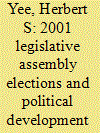

|
|
|
| 2 |
ID:
114084
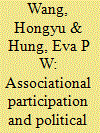

|
|
|
|
|
| Publication |
2012.
|
| Summary/Abstract |
Spatial distribution is an important dimension of research into the development of high technology (hi-tech) industries due to the knowledgeintensive features of these industries. This paper separates the agglomeration effects and the spillover effects, and analyzes the evolution of the spatial distribution of China's hi-tech sub-industries from themid-1990s by combining the geographic concentration index (locational Gini coefficient, concentration ratio) and spatial econometrics (Moran's I). The results reveal that, firstly, most hi-tech subindustries tend to be concentrated in the eastern coastal regions of China, while there are significant spillover effects from the eastern coastal regions to the central regions. The development model based on national hi-tech industrial zones is the primary reason for industrial agglomeration, and it is the result of both government direction andmarket rules. Secondly, on the macro-level, there has been a certain amount of geographical concentration and interregional division of labor among China's hi-tech industries, but there is low intraregional specialization. Furthermore, in contrast to the findings of most of previous studies, the distribution ofChina's hi-tech industries and that of its innovation capacity share similar evolutionary trends, although they do not completely overlap.
|
|
|
|
|
|
|
|
|
|
|
|
|
|
|
|
| 3 |
ID:
182589
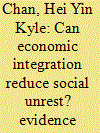

|
|
|
|
|
| Summary/Abstract |
When dealing with autonomous regions, states may utilize Unionist Economic Integration (UEI) programs to forge a stronger sense of unionism. However, the literature has not been able to explain why UEIs work differently across regions. With the identical UEI implemented in Macau and Hong Kong, Macau seems to be firmly within Beijing's grasp, yet protests in Hong Kong are still intensive. Why is economic integration effective in appeasing some regions, but not others in the same polity?
I argue that what makes UEI effective in appeasing a region is the region's economic dependence on the national center. UEIs add to the expected cost of contention, and thus high economic dependence sets that baseline to a higher degree, leading to effective appeasement with UEIs. I illustrate my argument with empirical analyses of two original datasets of protest counts and discontent with authoritarian institutions in Hong Kong, Macau, and Chinese provinces.
|
|
|
|
|
|
|
|
|
|
|
|
|
|
|
|
| 4 |
ID:
181121


|
|
|
|
|
| Summary/Abstract |
This article discusses the Eurasia Film Company (hereafter Eurasia), which was established in Macau in 1954; the making of its film Long Way, released in 1955; and more generally the issue of film production in Macau in the 1950s. This was a period of crisis for Portugal: despite the beginning of decolonization in the post-war era, the regime's policy was to preserve the colonies. It appropriated ‘Luso-tropicalism’, a theory developed by Brazilian sociologist Gilberto Freyre, which argued that the Portuguese had created a harmonious hybrid civilization in the ‘tropics’ through biological and cultural miscegenation. Luso-tropicalism became a major propaganda tool used by Portugal to deflect decolonization. Eurasia, which had links to the colonial government, presented a Luso-tropical ideal not only in terms of the content of the film Long Way which celebrated interracial love but also by its very nature—it was a Sino-Portuguese enterprise that also had Eurasians as shareholders—and in its production method. Its main objective was to propagate a positive image of Macau, in response to its pervasive negative portrayal in the international press and films, which often characterized it as a centre of vice. Long Way specifically responded to Hollywood and French films set in Macau by using similar elements, plot, and characterization, but it transformed Orientalist tales of crime, smuggling, and sin into a Luso-tropical story of refuge, order, and interracial love. Eurasia aimed to cleanse Macau's image and thereby justify Portuguese sovereignty in the territory in a period of crisis and uncertainty marked by decolonization, the Cold War, and tense Sino-Portuguese relations.
|
|
|
|
|
|
|
|
|
|
|
|
|
|
|
|
| 5 |
ID:
124245
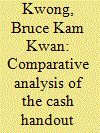

|
|
|
|
|
| Publication |
2013.
|
| Summary/Abstract |
In 2011, Hong Kong SAR government announced an unprecedented policy of cash handouts of 6,000 HKD to all permanent residents at the age of 18 or above as a means of defusing public discontent with economic policy and poor governance. Macau SAR has also been distributing similar cash handouts since 2008 to temper public dissatisfaction and widespread demonstrations. Initially, both SAR governments were very reluctant to initiate universal cash handouts. Unlike standard welfare programmes that are budgeted for annually, the cash payment scheme in Hong Kong SAR was a one-off handout. In Macau SAR, however, the payment scheme went from being a short-term policy to a long-term policy, while other welfare programmes were also allocated more public money. This paper argues that although such cash handout policies are avoidable, they are still being adopted by politicians who place self-interest above the public interest.
|
|
|
|
|
|
|
|
|
|
|
|
|
|
|
|
| 6 |
ID:
166326
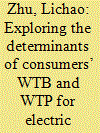

|
|
|
|
|
| Summary/Abstract |
As an important part of alternative fuel vehicles, electric vehicles are attracting more and more attentions worldwide. This study is designed to identify the key influencing factors of consumers’ willingness to buy (WTB) and willingness to pay (WTP) for electric motorcycle (EM) based on questionnaire survey. The results show that the respondents have relatively less understanding of the EM. When purchasing the EM, the respondents often pay more attentions to the EM's actual cost (sale price, charging fee, repair fee, and tax incentives, etc.), while the driving speed and load capacity of EM attract very little attention. The respondents' knowledge of EM as well as their education level and income level will promote the WTB and WTP behaviors significantly. While, their consideration on charging fee and family members present a negative influence on WTB and WTP. Using the contingent valuation method (CVM), it is estimated that the mean WTP value for EM is 1315.54 Macau Pataca (MOP), far lower than the current market price gap of 8000 MOP between EM and ordinary fuel motorcycle. The obtained results will help policy makers to understand consumer's purchase behavior of EM, and can provide some effective supports for EM development in Macau.
|
|
|
|
|
|
|
|
|
|
|
|
|
|
|
|
| 7 |
ID:
124243
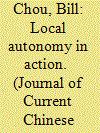

|
|
|
|
|
| Publication |
2013.
|
| Summary/Abstract |
This paper investigates how Beijing governs its two special administrative regions (SARs) of Hong Kong and Macau through leverages on their local autonomy. First, a conceptual analysis of local autonomy will be provided. Local autonomy is more than a zero-sum game between the central and local authorities over how much power should be granted or taken from the local authorities; it also concerns the space for cultural expression and the use of local customs in public administration. Second, the degree of local autonomy in Hong Kong and Macau will be critically examined. On paper, both SAR governments are able to freely make decisions on a wide range of policies. In practice, however, Beijing has the absolute authority to override the decisions of Hong Kong and Macau. It is argued that the autonomy in cultural expression can compensate for the institutional constraints on the two SARs' decision- making power and is thus able to alleviate public discontent - as long as the constraints do not conflict with the people's core values and ways of life.
|
|
|
|
|
|
|
|
|
|
|
|
|
|
|
|
| 8 |
ID:
013360
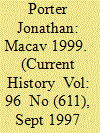

|
|
|
|
|
| Publication |
Sept 1997.
|
| Description |
282-286
|
|
|
|
|
|
|
|
|
|
|
|
|
|
|
|
| 9 |
ID:
160113
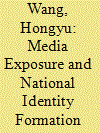

|
|
|
|
|
| Summary/Abstract |
Using survey method, this study compares the relative importance of exposure to Chinese media, pro-China local media, pro-democracy local media, and new media (e.g., Weibo, Facebook) on the building of national identity among Macau college students. We argue that the effect of media exposure on national identity formation is not uniform, owing to the political leanings of the media and the platform on which the information is transmitted (new media vs. traditional media). We find that getting news about China on Facebook is the most important predictor of the formation of national identity among college youth in Macau, followed by getting news on Weibo and exposure to traditional Chinese media. Conversely, exposure to pro-democracy local media and frequent use of Facebook exert a negative effect on national identity building among college youth in Macau. Positive sentiment toward China and trust in the central government act as mediators and fully explain the relationship between exposure to traditional pro-China media and national identity but cannot explain the positive effect of exposure to new media on national identity formation.
|
|
|
|
|
|
|
|
|
|
|
|
|
|
|
|
| 10 |
ID:
171029
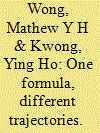

|
|
|
|
|
| Summary/Abstract |
Scholars have long identified the pivotal importance of business-led governance in the Hong Kong and Macau Special Administrative Regions (SAR) of China. Both are governed under a “one country, two systems” arrangement which in theory provides autonomy. However, this identical formula has resulted in very different trajectories, as the coalition in Hong Kong has failed to serve as an effective intermediary between the state and society amidst a series of governing crises, whereas the one in Macau has been largely successful in maintaining political stability. This article argues that a new class of elites in Macau has emerged and competes for political influence by building communal networks and mobilizing social support. In contrast, a relatively static elite structure in Hong Kong has done little to adapt to changing political circumstances.
|
|
|
|
|
|
|
|
|
|
|
|
|
|
|
|
| 11 |
ID:
095878
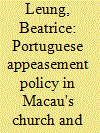

|
|
|
|
|
| Publication |
2010.
|
| Summary/Abstract |
For the last four centuries, under the policy of the Portuguese Padroado1454, the Macau Catholic Church has been closely associated with the Portuguese rulers of Macau in governing this 'Chinese territory under the Portuguese rule'. This church-state relationship in Macau before the Chinese takeover (1999) and after has become a client-patron relationship under the shadow of the Portuguese appeasement policy. In the context of the appeasement policy, this paper aims at discussing: (1) the close alliance between the Portuguese government and the Catholic Church in Macau, offering special privileges and convenience to the Church but weakening church capacity in evangelization and spiritual leadership; and (2) the interactions of the three actors in the triangular relationship among the Vatican, China and Macau.
|
|
|
|
|
|
|
|
|
|
|
|
|
|
|
|
| 12 |
ID:
100503
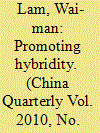

|
|
|
|
|
| Publication |
2010.
|
| Summary/Abstract |
This article traces the unique process of reconstructing the identity of the Macau Special Administrative Region and its people after the political resumption to China in 1999, and the political and economic significance of the reconstruction. As in other postcolonial contexts, identity is an arena of political contest where various discourses that embody re-appropriation of political traditions and legacies criss-cross. In Macau, the post-handover identity comprises the local, the national and the international components, with Macau characterized as a historical, colonial/cultural hybrid and economic object. In fact, the Macau identity after 1999 represents a re-appropriation of the image of colonial Macau propagated by the Portuguese administration since the 1980s. Also, identity making has been a process of incorporating instead of repressing or eliminating the identities of "the other," and building a stand-alone national identity is not the prime task in the reconstruction of an identity. Rather, multiple identity components are deliberately incorporated and promoted. The success of the process has fabricated Macau's relatively smooth reintegration with China and enhanced the legitimacy of its new government.
|
|
|
|
|
|
|
|
|
|
|
|
|
|
|
|
| 13 |
ID:
111820
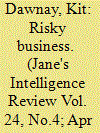

|
|
|
| 14 |
ID:
179972
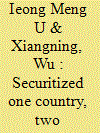

|
|
|
|
|
| Summary/Abstract |
This paper examines how Macau, with a different political and legal system under the “one country, two systems” principle, fits into China’s securitization and what impact that has on its local governance. We argue that in recent years Macau’s legal system has gradually transformed into a means of social control. Through case files related to the Assembly and Demonstration Law drawn from the Court of Final Appeal, we demonstrate that although Macau is unlike Hong Kong, where dissidents are subject to severe repression, Beijing’s emphasis on national security has weakened the checks-and-balances function of Macau’s legal system and substantially narrowed the scope of freedom of speech, even though it is nominally guaranteed and protected by the Basic Law.
|
|
|
|
|
|
|
|
|
|
|
|
|
|
|
|
| 15 |
ID:
087042
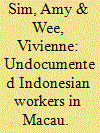

|
|
|
|
|
| Publication |
2009.
|
| Summary/Abstract |
Presenting new research findings on undocumented Indonesian migrant workers in Macau, this article explicates the dovetailing arrangements between public and private sector interests that are systemically creating undocumented labor migration flows. It then shows how these arrangements are structurally inherent in the mutual competitiveness of globalizing nodes of wealth creation. Undocumented migration cheapens production costs and results in a flexible black market of vulnerable, right-less, and exploited workers. Contrary to illusions of an urbanizing Asia with expanding spaces for civil liberties, the development of globally competitive megacities, built and supported by low-skilled migrant workers, rests on a global underclass of transient workers who bear the human costs of transience and labor flexibility, enabling megacities to externalize such costs and enhance their global competitiveness. The article analyzes the vulnerabilities of undocumented Indonesian workers in the context of Macau's rapid economic development as an aspiring megacity The Macau government's laissez-faire tolerance of such workers is grounded in its need for human labor that is abundant, cheap, marginal, and disposable. The flow of Indonesian migrant workers into Macau is linked to Hong Kong's exclusionary immigration policies, which aim at extricating surplus migrant labor. Meanwhile, the Indonesian government refuses responsibility for its migrant workers in Macau because Macau is not recognized as an official destination. The article shows how public and private interests motivate increasing numbers of migrants to become undocumented overstayers in Macau, as they try to avoid oppressive practices in labor migration from Indonesia and the exclusionary policies of Hong Kong.
|
|
|
|
|
|
|
|
|
|
|
|
|
|
|
|
|
|
|
|
|